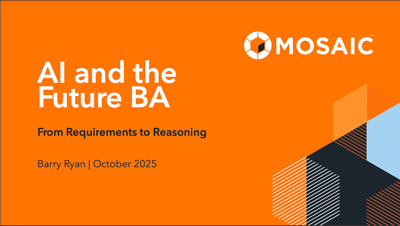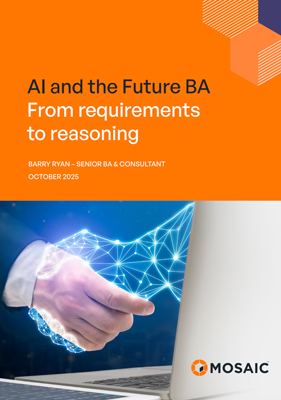
By Barry Ryan, Senior BA and Consultant, Mosaic
I’m still buzzing from Tuesday’s Festival of Business Analysis in Auckland. It was my first ever conference presentation, and I’ll admit – I was nervous! But the energy in the room, the support from the Auckland IIBA team (special thanks to Dan Lindsay and Deepa Singh), and the enthusiasm of all the participants made it an unforgettable experience.
The presenters were pragmatic and truly inspirational. I learned so much just by watching how they worked the room and shared their insights. Empathy, curiosity, and bold thinking were the threads that tied the day together.
In my workshop, we explored how the BA role is evolving in the age of AI – not being replaced but challenged to adapt. We talked about what tasks and skills we should automate, augment, or retain, and how reasoning (not just requirements) will shape the future of our work.
AI is a transformative force, not a replacement for Business Analysts. BAs must shift from asking “What should a system do?” to designing “How should a system think?”. This positions BAs as critical shapers of AI logic, ethics, and accountability.
With Agentic AI, BAs are expected to design and oversee reasoning processes, ensuring transparency, explainability, and ethical decision-making at scale.
BAs evolve into new roles:
These roles complement – not compete with – technical teams.
The “Vanishing Claim” story illustrates the cost of systems without reasoning: no transparency, accountability, or trust. Agentic AI requires reasoning frameworks – BAs design escalation points, guardrails, and logic criteria to keep AI decisions explainable and responsible.
By identifying which BA tasks can be automated, augmented, or must be retained, analysts can focus on human-judgment areas – like governance, reasoning design, and stakeholder interpretation. This is the strategic sweet spot for future-ready BAs.
A huge thank you to everyone who joined my session. Your willingness to collaborate, share ideas, and dive into new ways of thinking made the workshop so much fun for me. We covered a lot of ground, and I hope you left with valuable insights and a sense of excitement for what’s ahead.
Our world is changing fast, and as BAs, we’ll need to keep redefining, retaining, and augmenting our competencies and techniques.
Thanks again to the IIBA team, my fellow presenters, and all the amazing participants. Here’s to continuous learning and bold business analysis!

Download the PowerPoint presentation.



By Barry Ryan, Senior BA and Consultant, Mosaic
I’m still buzzing from Tuesday’s Festival of Business Analysis in Auckland. It was my first ever conference presentation, and I’ll admit – I was nervous! But the energy in the room, the support from the Auckland IIBA team (special thanks to Dan Lindsay and Deepa Singh), and the enthusiasm of all the participants made it an unforgettable experience.
The presenters were pragmatic and truly inspirational. I learned so much just by watching how they worked the room and shared their insights. Empathy, curiosity, and bold thinking were the threads that tied the day together.
In my workshop, we explored how the BA role is evolving in the age of AI – not being replaced but challenged to adapt. We talked about what tasks and skills we should automate, augment, or retain, and how reasoning (not just requirements) will shape the future of our work.
AI is a transformative force, not a replacement for Business Analysts. BAs must shift from asking “What should a system do?” to designing “How should a system think?”. This positions BAs as critical shapers of AI logic, ethics, and accountability.
With Agentic AI, BAs are expected to design and oversee reasoning processes, ensuring transparency, explainability, and ethical decision-making at scale.
BAs evolve into new roles:
These roles complement – not compete with – technical teams.
The “Vanishing Claim” story illustrates the cost of systems without reasoning: no transparency, accountability, or trust. Agentic AI requires reasoning frameworks – BAs design escalation points, guardrails, and logic criteria to keep AI decisions explainable and responsible.
By identifying which BA tasks can be automated, augmented, or must be retained, analysts can focus on human-judgment areas – like governance, reasoning design, and stakeholder interpretation. This is the strategic sweet spot for future-ready BAs.
A huge thank you to everyone who joined my session. Your willingness to collaborate, share ideas, and dive into new ways of thinking made the workshop so much fun for me. We covered a lot of ground, and I hope you left with valuable insights and a sense of excitement for what’s ahead.
Our world is changing fast, and as BAs, we’ll need to keep redefining, retaining, and augmenting our competencies and techniques.
Thanks again to the IIBA team, my fellow presenters, and all the amazing participants. Here’s to continuous learning and bold business analysis!

Download the PowerPoint presentation.
